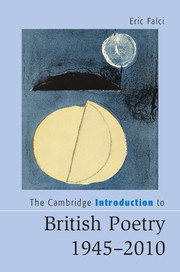Book contents
- Frontmatter
- Contents
- Acknowledgments
- Introduction
- Chapter 1 The Movement and Its Discontents
- Chapter 2 Decolonizing Poetry
- Chapter 3 Local Modernism
- Chapter 4 Late Modernism
- Chapter 5 The North
- Chapter 6 New Narratives
- Chapter 7 Platforms and Performances
- Conclusion: Archipelagic Experiments
- Notes
- Further Reading
- Index
- Cambridge Introductions to Literature
Chapter 1 - The Movement and Its Discontents
Published online by Cambridge University Press: 05 November 2015
- Frontmatter
- Contents
- Acknowledgments
- Introduction
- Chapter 1 The Movement and Its Discontents
- Chapter 2 Decolonizing Poetry
- Chapter 3 Local Modernism
- Chapter 4 Late Modernism
- Chapter 5 The North
- Chapter 6 New Narratives
- Chapter 7 Platforms and Performances
- Conclusion: Archipelagic Experiments
- Notes
- Further Reading
- Index
- Cambridge Introductions to Literature
Summary
The first key signs of what came to be known as “the Movement” were two 1954 articles in The Spectator. In an August 27 piece titled “Poets of the Fifties,” Anthony Hartley reviewed four volumes published by the Fantasy Press and, after describing their styles, influences, and shortcomings, concluded, “we are now in the presence of the only considerable movement in English poetry since the Thirties.” The emerging movement is typified by the early poetry of Thom Gunn, Donald Davie, George MacBeth, and Jonathan Price (the four poets under review), as well as John Wain, Kingsley Amis, Philip Larkin, and Philip Oakes (the other young poets mentioned by Hartley). The poets are influenced primarily by William Empson and, to a lesser degree, Auden, and what unites their poetry is its tone, which Hartley describes as “‘dissenting’ and non-conformist, cool, scientific and analytical.” An article titled “In the Movement” and published in the October 1 issue continues Hartley's line of thinking, describing Auden and the 1930s poets as well as the nebulous output of the 1940s and early 1950s as part of a passing age and suggesting that “within the last year or so,” there have been signs of a “new movement” in literature. The unsigned essay, which was written by J.D. Scott, names Davie and Gunn as key poets in this new “movement” and adds several novels – by Wain, Amis, and Iris Murdoch – to the mix of representative texts. While admitting that the sample size is small, Scott nonetheless gives a fairly comprehensive summary of its attitudes and tendencies in what has become an oft-quoted encapsulation: “The Movement, as well as being anti-phoney, is anti-wet; sceptical, robust, ironic, prepared to be as comfortable as possible in a wicked, commercial, threatened world which doesn't look, anyway, as if it's going to be changed much by a couple of handfuls of young English writers.”
These and other articles, along with Wain's promotion of the new writers on his Third Programme series First Reading in 1953, helped raise their individual profiles as well as collate them. The success of Philip Larkin's The Less Deceived in 1955 brought more attention, and D.J. Enright first grouped the poets who we've come to identify with the Movement in his 1955 anthology, Poets of the 1950s.
- Type
- Chapter
- Information
- The Cambridge Introduction to British Poetry, 1945–2010 , pp. 14 - 41Publisher: Cambridge University PressPrint publication year: 2015



